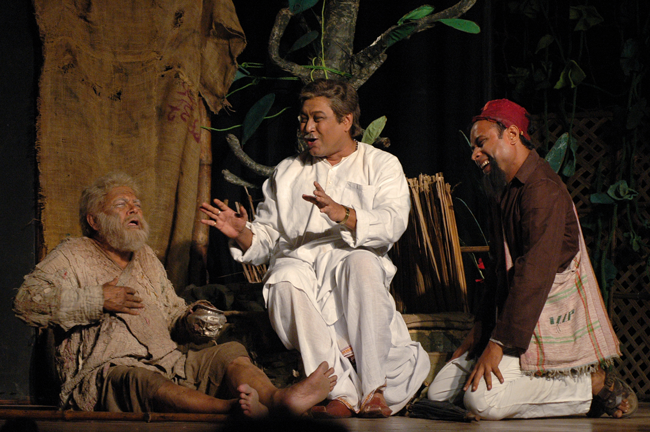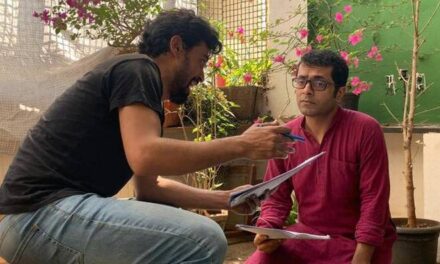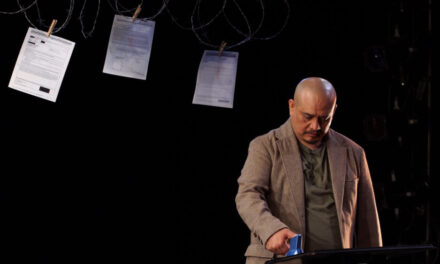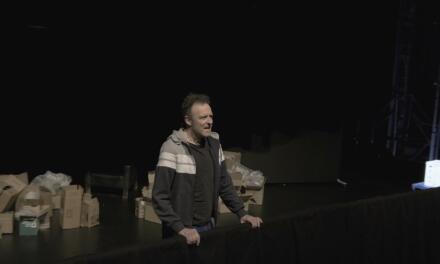Six decades of writing, acting and directing often inspired by the changing milieu — Bengali playwright Manoj Mitra has a new work on Socrates.
When the applause had given way to a hum of voices, playwright Manoj Mitra looked around the room, trying to gauge the response of his sixty-year-old group to the new play he had just read.
Lucky to be at that first reading, my mind was bristling with questions. What does it take to write over a hundred plays like this? Full length and one-act, each play unique and original. Plays that had been translated into several Indian and foreign languages and continues to enthrall audiences. Also in his kitty are countless radio plays, children’s plays, film scripts, and books on theatre and film.
Writing Jene Shuney Bish (Poison, Knowingly) must have been tough because the locale was Athens of 405 BC. But then as he had done for his sources in Indian epics, Puranas, and historic events, Mitra had drawn on his lived experience to understand the essence of all that prevailed.
His Socrates is a refugee, an outcast and menial laborer with an insatiable thirst for knowledge. A thirst the ancient democracy had answered with a cup of poison. But Socrates lives on in the writings and achievements of followers. Here, Socrates celebrates the arrival of a daring new artistic style. Art and aesthetics being integral to the quest for the truest truth.
In his mind, Mitra was already casting actors for the roles: Paraesius, Scylla, Mickkas…
Catching the eye of the youngest member of the group Mitra asks: “Is the play any good?” The earnest nineteen-year-old says, “Sir, such powerful lines! And so relevant. We must do it.” Manoj Mitra, Sangeet Natak Akademi awardee and Asiatic Society gold medallist for playwriting, smiles with childlike joy.
Another, a bespectacled fumbler, says haltingly: “Isn’t it a bit too relevant? One can’t be too careful these days. A simple farce would have been safer…”
Don’t farces sting? What about Mitra’s Narak Guljar, Rajdarshan, Chokhe Angul Dada, Munni O Saat Chowkidar, Aschourjo Funtosee, Kinu Kaharer thetar? Can any play be without relevance and still be good? Would people repeatedly view his plays had they not found a deeper assonance with their life and times?
A Thousand Shows
Sajano Bagaan, staged for the first time in 1976, has had thousands of shows. Yet even now when Manoj Mitra as Banchha, the centenarian farmer, tells his newborn grandson of the beauty of his garden in the ephemeral mist of dew, the audience too feels the endearment of the soil something to be protected against all odds.
Do we not recognize Hekim’s frustration when in Mitra’s play Galpo Hekim Saheb (1992)? He is forbidden by the zamindar of his village from seeking roses from a rival zamindar, even though the roses are needed for a new life-saving medicine. Or when the Hekim is nearly thrashed to death for daring to treat the inhabitants of another village. Do we not wish for a world where all of the humanity unites in the nurture of life?
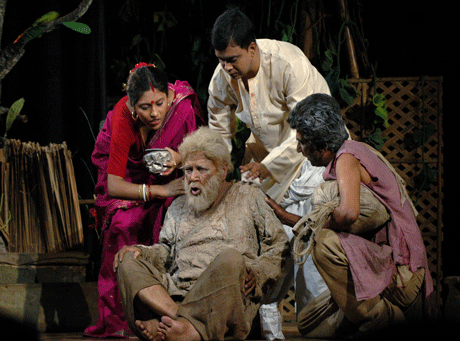
Sajano Bagan by Manoj Mitra. Photo courtesy of http://sundaramtheatreunit.com/main/new-production-details.php?id=470
Daily events have often provided the impetus to his plays but that was always only the beginning. Like in Hekim Saheb, “The idea of a character like Hekim had been with me for a long time, a practitioner of ancient Unani medicine. Then the Babri Masjid incident happened and I couldn’t fathom why my country couldn’t allow all beliefs to coexist,” said Mitra.
Galpo Hekim Saheb saw a rather unique participation by stalwarts of different fields; Tapan Sinha (film director, winner of Dada Saheb Phalke Award), noted playback singer Hoimanti Shukla, light designer Tapas Sen…perhaps they felt the play said something they all wanted to be identified with.
In many of Mitra’s plays, songs play an important role. The song Katha Bolona Shobdo Korona (Don’t Say A Word, Don’t Make A Sound) of the play Narak Guljar’(1975) became a song of protest against Emergency.
“Not just the song, the entire play had direct references to the long suspension of basic fundamental rights across the country. Phrases and words used as slogans for Emergency were turned against it. People loved the songs. I remember many years later, on a flight to Jalpaiguri with noted Bengali writers and poets, Sunil Gangopadhyay suddenly started singing the song announcing rather loudly, ‘The song now belongs to all of us.’ And everyone on the plane laughed and cheered.”
In the 1960s Mitra began Aswathama as a literary exercise exploring the Mahabharata. Ten years later, real life was imitating the Aswathama tale. It was the Naxal era and cold-blooded massacres were routine. “The idea of the young being turned into ruthless, unquestioning killing machines and treated as collateral damage, disturbed me,” recalls Mitra. Bibhas Chakraborty produced Aswathama in the 70s and Kaushik Sen is staging it now.
The outcast and the oppressed often form the crux of Mitra’s plays as they seem to threaten the status quo. We have Badami and the tribals of Chakbhanga Modhu, Dwaipayan, the transgender of Chhayarprasad and Aloka of Alokanandar Putrakanya who adopts a child. Even the blind Dhritarashtra, unwilling to wage a war, in Ja Nei Bharatey is a misfit as is Gajamadhav Mukutmani, the ordinary middle-class man who refuses to join the rat race, in Porobas.
In Jene Shuney Bish, Socrates and his young followers question everything and council members feel threatened. The play questions the need for war, patriotism and individual freedom—issues that were topical and controversial even in the 405 BC Greece.
Coming away, I see a beggar trying to cross the road and I remember Tantula, the young patriotic soldier of Jene Shuney Bish crippled by consecutive wars… just one of those images that remain long after a reading is done.
This post first appeared on The Hindu on November 2, 2017, and has been reposted with permission.
This post was written by the author in their personal capacity.The opinions expressed in this article are the author’s own and do not reflect the view of The Theatre Times, their staff or collaborators.
This post was written by Sebanti Sarkar.
The views expressed here belong to the author and do not necessarily reflect our views and opinions.

